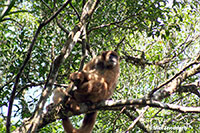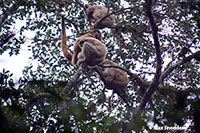| 1967-1969 |
Board of Directors, New York Scientists' Committee for Public Information. Participated in public education on social problems with scientific content - particularly air pollution. Activities included analysis for local congressman of technical reports on projected health effects of proposed expressway. Also advised Oil, Chemical and Atomic Workers union on environmental health issues in the workplace. |
| 1971-1977 |
Instigated formation of Committee on Social Issues of the Society for Neuroscience and served as committee member.
|
| 1975-1979 |
Ad hoc Committee on Availability of Non-Human Primates, Society for Neuroscience.
|
| 1984-1986 |
Program Committee, American Society of Primatologists. |
| 1997-1999 |
Established and coordinated Macula and Nutrition Group. Leadership was transferred to John Landrum of Florida International University in 1999. The group had dinner meetings annually at the Association for Research in Vision and Ophthalmology until 2014. The dinners began with 40 participants and grew to include as many as 116 people in some years.
|
| 2002 |
Established and chaired Conservation Information Service to endorse projects relevant to conservation of primate habitats. Internet web site http://pin.primate.wisc.edu/infoserv/cis/. Site not currently functional because of lack of web support. |
| 2003 |
Loaned macular densitometer to Epidemiology Branch of National Eye Institute and instructed their staff in its use to help plan studies related to new clinical trials. |
| 2005, 2006 |
Arranged funding of ~ $36,000 for purchase of 7.2 hectares of Brazilian Atlantic Forest adjacent to parkland in Sao Paolo state as a base for conservation-oriented field studies. |
| 2006, 2007 |
Assisted in preparation of funding proposals for Pro-Muriqui, a Brazilian NGO dedicated to conservation of the largest neotropical primate, Brachyteles arachnoides.
Click on an image for a closer view. |
| 2008 |
Pro-Muriqui proposal was funded for 42,820 Euros by the National Committee of the Netherlands of the International Union for the Conservation of Nature (IUCN NL) to protect 100 hectares of Brazilian Atlantic Forest in the home range of the monkeys.
|
| 2013 |
Established the Opportunity Scholars Fund at the University of Texas at Austin with an endowment of $100,000. The fund is designed to help students obtain a degree without going into debt. In return for this opportunity, scholars will be expected to contribute to the fund when they are earning money and benefitting from their education. See http://giving.utexas.edu/opportunity-scholars/ for more information, or a brochure is available in the Downloads section of Max Snodderly’s web page. |
| |
|


